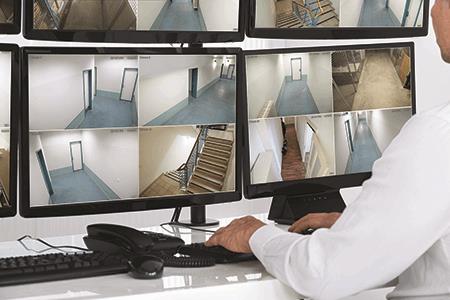Grow Your Law Enforcement Business
By The Business Solutions Network
An integrator projects big growth in law enforcement through the sale and implementation of IP cameras, hyperconverged storage, and access control solutions.
When it comes to the use of technology in law enforcement, much of what we’ve written about in the past has been focused on mobile computers in vehicles, e-citation solutions, and mobile printers for ticketing. More recently, we’ve written about surveillance cameras in the car, on the body, or used throughout municipalities. While these applications all still exist as opportunities, there’s also a very real need for video surveillance and access control on and around law enforcement facilities. Essentially, law enforcement has basic physical security needs just like many other verticals.
 One company that’s found recent success selling physical security solutions within the law enforcement vertical is DVSS, a security integrator that services the New York City area. Chris Casanova Jr., VP of sales for DVSS, says that while the integrator has worked with law enforcement customers for years, an opportunity a couple years ago for a well-known agency propelled his company into a new tier and gave a healthy boost to DVSS’ revenue.
One company that’s found recent success selling physical security solutions within the law enforcement vertical is DVSS, a security integrator that services the New York City area. Chris Casanova Jr., VP of sales for DVSS, says that while the integrator has worked with law enforcement customers for years, an opportunity a couple years ago for a well-known agency propelled his company into a new tier and gave a healthy boost to DVSS’ revenue.
Recently, Casanova says his company has completed a couple special projects within the metropolitan area. The law enforcement projects DVSS implements typically include a variety of IP cameras (ranging up to 32MP depending on the need), as well as storage solutions to archive the video. Video storage is one area where the integrator really excels, leveraging hyperconverged storage solutions for their manageability, affordability, and ability to grow as customers’ needs change.
Within this market, Casanova says agencies can need retention ranging from 30 days to a full year. “They can have a case that happened a year ago and need video for the courts,” he says. “Hyperconverged storage can handle the threshold and workload a typical law enforcement agency will need.”
In addition to cameras, the integrator also sells and installs access control solutions for law enforcement agencies. All said, Casanova feels his company has honed its law enforcement capabilities and solution set over the past few years. Now the company is reaping the rewards.
The impetus behind the majority of these installs is a technology refresh. In some cases, Casanova says there are still agencies looking to replace analog cameras with IP cameras. In other instances, he says, IP cameras have improved so much in recent years that early-generation IP cameras are being replaced. “Just a few years ago, everyone was excited by a 10MP camera,” he recalls. “Today, we have 30+MP cameras.” Apart from refreshes, Casanova says agencies are often looking to extend their security by adding cameras.
In most situations, the integrator says the sale is fairly straightforward — now that the integrator has built relationships and is a trusted resource. “Law enforcement is a difficult market to get into,” he says. “While there are bids, you have to pay your dues to even have a chance. Ultimately, after some success and proving your capabilities, you almost become part of the family.” At that point, winning business becomes a little easier.
According to Casanova, there’s not a whole lot of coaching that needs to be done during the sales process. “Law enforcement knows what it wants,” he says. “They’ve seen it all. By knowing what they want and perfecting what they want, we have created a big advantage for ourselves.” Casanova continues by explaining that over time the integrator has learned how to customize solutions just for this market. By doing a good job, he’s created happy customers that tell their friends in other law enforcement communities, leading to some nice word-of-mouth referral work for the integrator.
Of course, succeeding in this market takes hard work and dedication. Frankly, DVSS wouldn’t even be a player if not for decisions the company made regarding its IT know-how and capabilities. “Having a network engineer on staff is something we had to do,” he says. “It’s taken us to a new level. We deal with CIOs and IT engineers with technical questions that we must be able to address intelligently. You’ll flounder in today’s market without IT expertise.”
In addition to needing IT expertise, Casanova says another must-have trait is “follow-through.” “With law enforcement, you must get things done like you promise,” he says. “They are big on loyalty principles. If you say you’ll have something done by a certain time, it better be done.”
Now that DVSS is entrenched in law enforcement, the integrator sees additional opportunities. As a full-service provider, the company does networking work and even VoIP installs. Casanova says he’s always looking to see if such opportunities are available with his customers. Of course, there are other security-related niches within law enforcement, but Casanova prefers to steer clear currently. “Dashboard cameras and body cams are hot, but there are complexities involved, so we’d rather pass and focus on our core competency,” he says.
The integrator’s core competency is working just fine. In fact, Casanova projects that 25 percent of DVSS Security’s revenue will come from law enforcement in 2017. At the rate of growth the integrator has been experiencing, that number will most likely increase in the years that follow.
